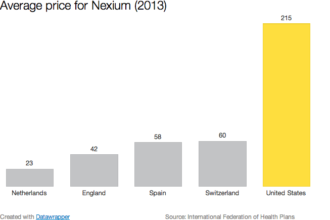 We all know the expression, “We often don’t appreciate things until they are gone.” There is a corollary: “We often appreciate things more before we get them than once we have them.”
We all know the expression, “We often don’t appreciate things until they are gone.” There is a corollary: “We often appreciate things more before we get them than once we have them.”
 We all know the expression, “We often don’t appreciate things until they are gone.” There is a corollary: “We often appreciate things more before we get them than once we have them.”
We all know the expression, “We often don’t appreciate things until they are gone.” There is a corollary: “We often appreciate things more before we get them than once we have them.”
Surely there is ample academic research in this area. Academic concepts such as “Cognitive Dissonance” and “Transactional Involvement” come to mind and seem to apply; however, I will base this article on personal observations and years of experience working in healthcare.
The first time I observed this phenomenon was after the launch of Merck’s Crixivan for HIV in 1996. Recall that at the time, the AIDS epidemic was front-page news with thousands of people afflicted and with many suffering and dying. There were loud cries for more research; cries calling for the accelerated development of new drugs; cries for solutions at virtually any price…and money was no object!
Crixivan was developed at a cost of over $1 billion, resulting in the most powerful anti-retroviral at the time, with excellent properties to bring down viral loads and to improve not only disease state and quality of life, but also morbidity and mortality. This product helped change what was essentially a terminal illness into a chronic one that could be managed.
At launch, Crixivan was priced around $12 per day, justified in part by the costly research and huge capital-intensive manufacturing plants that had to be built just for this product (taken in grams not milligrams, so the need was for tons of ingredient materials not pounds or kilos). But, once the product was approved and priced, many quickly forgot that there had been nothing available before and that people had been willing to pay a lot for something, anything, to help and bring hope in this area. They conferred a very high value-for-money on a potential solution. Soon after the product became available, people’s perceptions suddenly turned around and the predominant feeling became that the drug was too expensive, changing the perceived-value equation.
It is an interesting dynamic that can be observed in many aspects of daily living. In healthcare, we’ve seen it with heart disease where great science has led to the development of statins and new classes of anti-hypertensives and anti-platelet agents, all leading to dramatic improvements in morbidity and mortality from heart disease – the number one killer. Yet, there are many complaints that a couple of dollars a day is too much to pay for this benefit.
A similar experience has been seen with Genentech’s Herceptin for breast cancer and more recently with Gilead’s Sovaldi for hepatitis C. For a long time, hepatitis has been treated with old interferon-based agents which are extremely difficult to tolerate and are moderately effective. Few patients elected to be treated or did not complete treatment, so overall success and outcomes improvements have been limited — and still expensive, though arguably not as costly as if all eligible patients were successfully treated. Then new drugs like Vitrelis and Incivek, with a lower incidence of side effects resulted in better success rates.
More recently, Sovaldi demonstrated to be more effective, to allow for a shorter course of therapy, and to be better tolerated…but definitely much more expensive for each patient treated. The argument that supporters of this product make is that it may be more expensive on a per-patient basis, but the benefits are such that, overall, makes it a better value. The costs of this untreated or poorly-treated disease are staggering – not only in economic terms but also in all the ways serious diseases affect quality of life, and more. What is scaring payers most is not necessarily the cost of the product for a single patient, but the likely total cost across all of their patients because 1) the disease is highly prevalent, and 2) with these advances more people will actually get treated and will actually stay on treatment, thus driving the overall cost. But then the disease will be managed, with ensuing benefits.
The purpose of this article is not to support or justify high prices of medicines or any similar agenda. It is simply to highlight that pricing of drugs and their resulting cost is not a straightforward calculation and is not simply a matter of facts and figures; there is this curious phenomenon around perceived value that we tend to desperately want and need solutions to serious problems, at any price, and then when we get them, they are too expensive – also at any price.
For a discussion on The Price, The Cost and The Value of Pharmaceutical Care, refer to an earlier article on this site: http://healthworkscollective.com/david-davidovic/128056/bio-pharmaceutical-care-price-cost-and-value
Is it a philosophical, psychological, social or economic discussion? Or all of the above?

_5.jpg)





